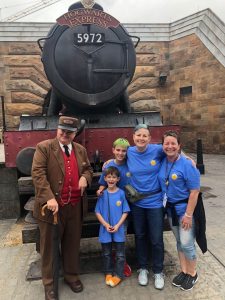Henry Nicsinger was cured of cancer once, then he was cured again, and again, and again, and again. Diagnosed with testicular cancer at 31, declared cancer-free after undergoing surgery, Henry went through surgery once more twenty years later when he was found to have a second primary bilateral occurrence of the disease.
A rare cancer, testicular cancer is also considered to have a very high cure rate and relatively low rate of metastases and recurrence, prompting Henry’s self-description of “beating the odds in a bad way.” Throughout his treatment, Henry was considered to be a rarity–”old” for a first time diagnosis, even “older” for an extremely uncommon bilateral diagnosis, and when the cancer metastasized to his lung for a second time, no one believed that he could actually feel the tumor, until doctors saw that it was indeed pressing on a nerve. Those mets, and ones to his lymph nodes, set the employee benefits consultant from Kansas on a relentless course of treatment that eventually led him to Indiana.
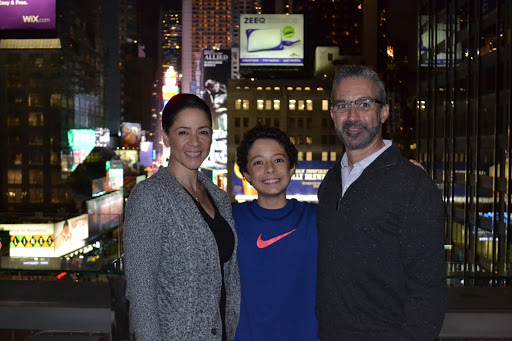 |
| The Nicsingers out on the town during their NYC Inheritance of Hope Legacy RetreatⓇ |
Henry’s humble ordinary-guy persona might fool you, but he has one heck of an extraordinary outlook. That goes for his wife Melanie, too, whose refreshing honesty about caregiving must hold the key to how she nursed him through a stem cell transplant following high-dose chemo in record time.
As he was admitted for the transplant, Henry asked his nurses what had been the fastest time someone had ever successfully engrafted. (Engrafting is the term for when the transplanted stem cells successfully begin making new blood cells.) The average was 15 days, although it had been done in as few as seven. Henry had many factors against him–his age, previous chemo, and a history of radiation to his abdomen. A history of radiation which should be noted, Henry had doubled up on in order to complete by December 31st during the previous calendar year. Just as he approached his radiation schedule, Henry set a goal to finish this new treatment as soon as possible.
Beating the odds in a good way this time, Henry engrafted in seven days and is convinced Melanie is the reason why, “She allowed me to only focus on healing.” A writer and researcher by profession, Melanie studied diet, exercise, and more to help Henry maximize his body’s potential to heal. She also took over all the logistical aspects of family life and recorded everything Henry did to report back to his doctors. Her single-minded task of getting Henry cured made him comfortable and confident with their decisions. He is quick to point out that they knew the outcome might have not been what they hoped for, but they knew they were doing all the right things.
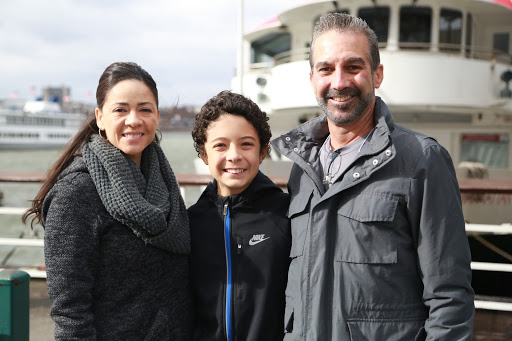 |
| Melanie, Zacary, and Henry enjoying time together in NYC |
As part of Henry’s treatment plan, the entire process of high-dose chemo followed by stem cell transplant was repeated just days later. A less-determined patient might have thought his strategy of racing the clock backfired when he had to do it all over again, but not Henry. “I guess I’ve got to beat my record now,” he quipped. And he did–engrafting in just six days during round two.
When asked how she did it–caring for Henry while away from their son Zacary, just 12 at the time, Melanie points to their strong marriage, “I always started from that place of faith in each other and our internal faith. Henry continues to inspire me with his strength and dedication to every step, no matter what the news. He has never asked ‘why me,’ so that has inspired me to never ask the question either.”
Henry’s smile is audible as he good-naturedly counters his wife, “You asked about her, and she started talking about me. I think what that means about the caregiver is that there is only one: the team. It wasn’t my journey or her journey, it was the team. I was always so confident because of what she was doing. We were partners and we could talk about anything.”
Their good communication and honesty with each other is quickly proven when asked about the specifics of caregiving. Henry mentions the importance of the caregiver taking care of themself. Melanie chuckles, “You can tell he was the patient.” She continues, “ You hear that advice all the time, but during treatment, if someone said that to me, I knew they had no clue. I wouldn’t expect him to take care of himself if I was dying. People would say, ‘Go get a massage.’ Yeah right. Not gonna happen. But you might tell a caregiver to take a little break and walk down to get a coffee.”
Small acts like those are what worked for Melanie. She ordered a slightly more special mocha instead of a basic quickly-poured black coffee, enjoyed a few sips of it by herself in the garden, maybe called home to check in with Zacary, and then took three extra minutes on the stairs instead of the elevator. “I knew I was the person talking to the nurses, doctors, and Henry. I had to be able to interact with everyone from a place of calmness.”
That was one strategy that allowed Melanie and Henry to be what they call “good patients.” Another goal they kept at the forefront of each day was to strike the right balance between advocating for his treatment and recognizing that while he best knew his body, the nurses knew more about the disease and treatment than they did. The Nicsingers are sure this attitude of respect and empowerment made “every step easier.” Henry also advises newly diagnosed patients to seek out facilities with good nurses, because they do much of the actual care, and “know all the tricks.” It was a nurse, in fact, who pointed the Nicsingers to Inheritance of Hope. Henry explains that nurses are oftentimes the unsung heroes who can more readily intercede if extra attention is needed from a doctor, “There is a loop created between the patient, nurse and doctor. Let them know that you DO want to know all the details. Push yourself to ask your nurses questions.”
Although more than two years out from the completion of his treatment, Henry is still ready to ask the hard questions at his now-yearly follow-up. “We had conversations before every scan. Everytime we went in, we had a plan and questions for the next step. That helped us,” he remembers. “We knew we would get news, one way or the other, so we decided to get ready for either. Some people don’t want to talk about it until they hear what a scan showed, and then they are too shocked to ask questions. It doesn’t make the anxiety any less–I don’t think you can–but at least when you come out, if you have talked beforehand, you knew enough to ask the right questions.”
The Nicsingers also established a positive post-appointment ritual of going to a favorite restaurant. With a laugh, Henry says, “No matter the news, at least I knew I was going to get the seafood soup!” Looking back, when asked what they know now that they wish they had known when he was first diagnosed, both agree that they could have given themselves more compassion.
Melanie elaborates that the couple thought it was all over once he was declared to be in remission, but at the two-year mark, they had a hard conversation about the toll the entire ordeal had taken. Henry concurs, “While I was in Indiana, we were so focused on the day-to-day. Everything else became background noise. When we came back to Kansas City, we didn’t deal with the emotional aspect. Things we avoided were allowed to simmer and come to the surface. There is still stuff like that we are discovering.”
Henry and Melanie would also tell newly diagnosed families to go on an Inheritance of Hope Legacy RetreatⓇ. When Zacary was 13, the family of three went on the 2016 retreat to New York City, and came back with new friends and renewed perspective. “The second you step off the plane, you are part of a family,” Melanie says. “We still keep in touch with the people we met. It is a unique perspective to be able to give to one another in times of happiness and sorrow.”
As important as the relationships they gained were the conversations they had. According to Melanie, “You gave us real time. Those moments I still hold with me. In the group, we were each so impacted by the others’ stories. And having separate time for the diagnosed parent and caregiver–that never happens in real life. The children were taken out of that and shown a good time. Zacary was happy and smiling the whole time. He was also able to talk about the fact that he was scared. It wasn’t just a fun trip, but those moments with counselors were so important. I never knew we needed to be separated to talk about certain things.”
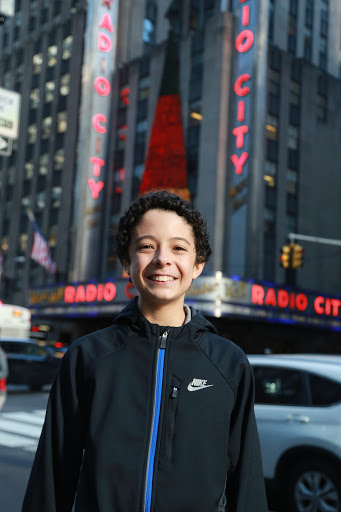 | 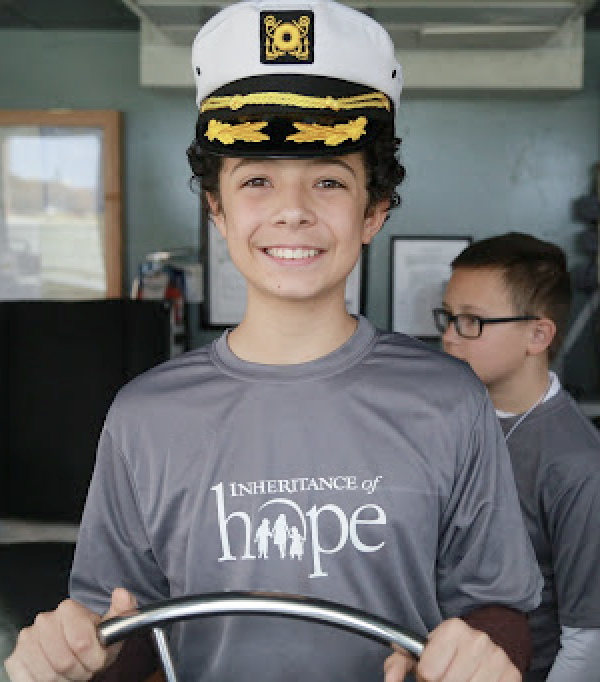 |
| Zacary takes charge in the Big Apple | |
Henry feels just as strongly, “The overall support is more than you can put into words. I don’t even know how to talk about it. It’s like the Visa commercial–priceless. The other thing I took home was perspective. People say I have a great attitude. I feel like I don’t have a choice, but I saw people going through much worse, and they have a great attitude. I don’t know that I could do that. We were all in a little bit of awe of each other. There was such an energy, safety, and support. You could talk to those people and you knew they understood.”
Besides all this, the Nicsingers, like every other IoH family, simply had a great time being together. Henry describes, “Zacary fell in love with New York City and IoH. We all did. I remember at the Rockettes, we were seated behind a lot of other families and had this beautiful view of everyone. Melanie said, ‘Look at all their faces. They are all happy now and not thinking about any illness.’ Zacary got that from every aspect.”
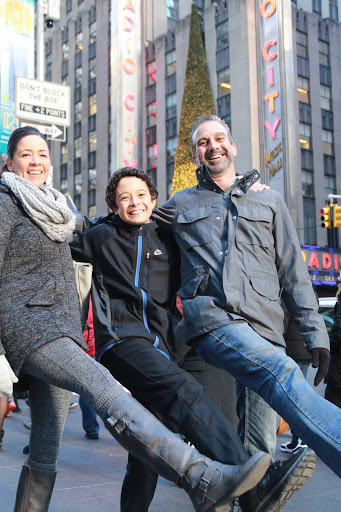 |
| The Nicsingers warming up for the Radio City Music Hall Christmas Spectacular |
To new IoH families applying for or coming on a retreat, the Nicsingers say, “Don’t worry about anything–what you will wear, the schedule, or anything.” Henry adds, “We don’t have any advice. We are just jealous. Soak it up. Soak it all up. You’ll never meet a nicer group of people.”
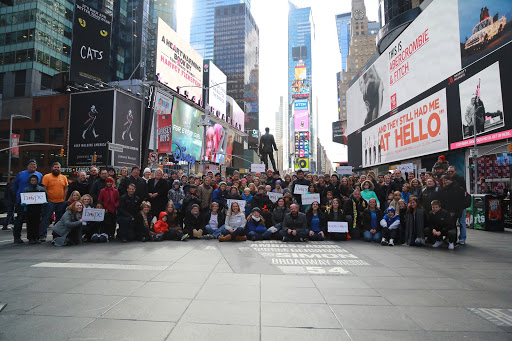 |
| The Nicsingers with their IoH Family |
Angie Howell is constantly inspired by the people she meets in the Inheritance of Hope family. Her connection to IoH goes back to Davidson College, where she met Kristen Grady Milligan the first week of their freshman year. Kristen eventually started Inheritance of Hope with her husband Deric, and Angie heard about their work at a college reunion. In 2010, the two former hallmates got back in touch, and Angie became involved in IoH shortly afterwards. She has served as a Legacy Retreat volunteer, Coordinator, and now, as Communications Manager, Angie helps tell the stories of IoH.

